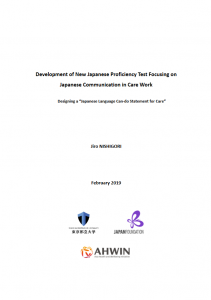RESEARCHERS
Jiro Nishigori, Professor, Graduate School of Humanities and Social Sciences, Dean of Department of Human Sciences, Tokyo Metropolitan University (TMU), Japan (Project Leader)
Tokyo Metropolitan University (Japan) Team: Ai Nomura; Keiko Okumura; Mamiko Kato; Kyoko Okumura; Aki Oide
Japan Foundation Japanese-Language Institute (Japan) Team: Fumie Yanashima; Mamoru Ikuta; Wei-Jian Gao; Aki Shinohara; Yoshiko Furukawa
ADVISOR
Satoshi Miyazaki, Professor, Graduate School of Japanese Applied Linguistics, Waseda University, Japan
The cross-border movement of care workers is getting more and more common as the world population is aging. Especially in Asia, which is projected to experience the most rapid aging in the world, the transfer of skills and knowledge of long-term care from earlier aged countries and regions to their latter aged counterparts is crucial.
Japan is no doubt a forerunner in terms of population aging, but historically it has almost completely closed its labor market to foreign care workers. In response to the expected serious shortage of long-term care workers, Japan is now beginning to alter its policy on the foreign care workforce. One example is the newly introduced category of “elderly care work” in Japan’s Technical Intern Training Program (TITP). The TITP already covered certain industries such as agriculture, fisheries, construction, textiles, and so on. Elderly care is the first category within the TITP that is a human-oriented industry. It requires adequate Japanese language skills to communicate with the older people who are receiving care. And the aim of the TITP is not only to ease Japan’s care workforce shortage but also to transfer care skills and knowledge from Japan to the trainees’ home countries, which are mainly Asian countries. To achieve these goals, a certain level of Japanese language skills is included in the requirements for TITP candidates who are working in the caregiving industry.
There are several Japanese language tests proposed or already in use, such as the Japanese Language Proficiency Test, but the tests that have been developed so far do not necessarily look at the test takers’ language skills for care work. It is commonly recognized among the care industries in Japan that a new Japanese language proficiency test focusing on care work urgently needs to be developed considering the expected influx of foreign care workers to Japan. It will also contribute to the transfer of Japan’s experience and knowledge about elderly care to the region.
This study will establish a “Standard Japanese Proficiency Can-Do List for Care Workers.” The list will be created through an analysis of existing Japanese proficiency tests and standards, the results of preceding studies on teaching materials for care workers, and other resources. The goal of this study is to establish a list that shows the standard of required language skills and basic vocabulary for care workers. The actual tests will be developed and administered by private institutions based on this list.
It is commonly said that working in Japan can be hindered by high language barriers and Japan has been behind the world in terms of developing language proficiency tests for professional fields. By helping to develop criteria for Japanese language training targeting foreign care workers, it is hoped that this study will facilitate the smooth transfer of Japan’s experiences, skills, and knowledge in the field of elderly care to those countries and regions that are rapidly aging as well.


